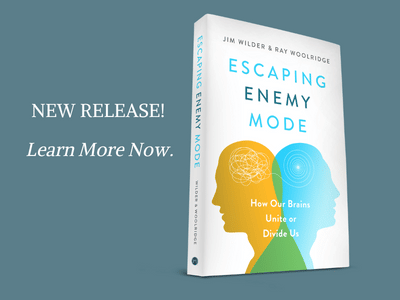Did you know that your body knows what you’re feeling even before you do?
In neuroscience today we’ve discovered that the right hemisphere of our brain is where our “control center” operates and it’s also responsible for the storage of “experiences”. In simple English this means that everything that you experience, and all the information from your five senses, is processed, stored, and retrieved faster than any conscious verbal understanding of it. (All that takes place in the left hemisphere.) Your body knows what you’re feeling and how you’re reacting to a situation before you do.
THRIVEtoday has identified 19 relational skills we need to master, one of those skills is called “Take a Breather” or “Timing When to Disengage” (Skill 9). I consider this the very important life skill of recognizing the signs of overwhelm, both in myself and in those I’m in relationship with.
This truly begins by pointing the arrow directly at yourself first.
“But wait!”, you insist, it’s so much easier to notice when that other person is about to lose it. Ok, I’ll let you look there for just a minute.
What does it look like when your spouse, or parent, or child, or teacher, or boss is about to leap into the “O”-Zone? (Overwhelm Zone)
Answers might include:
- Louder voice, yelling to screaming and crying
- Intense frown
- Aggressive body language
- Cursing
- Widened eyes or extra squinted eyes
- Clenched teeth or fists
- Excessive energy (jumpy leg, aggravated look)
- Holding breath, barely breathing
- Temper tantrums, slammed doors, etc.
- Extra stabs of sarcasm
Does this sound about right?
Ok, now let’s move back to us. Lets peek at the log in our own eye when it comes to this life skill.
Do you realize that if you have started to practice mindfulness that you’ll be able to assess your body’s signals much sooner than if you waited for these external signals to cause your loved ones to look at you like you are crazy?
Making it a habit to do a body check, teaches you to notice when your heart rate is increasing, when your breathing is becoming shallow and short. The only way you can ever really notice this is if you have purposefully started paying attention to what your “normal” rate is.
Recognizing the “O”-Zone in me begins with finding out what normal feels like. Many of us have never really given this much thought. We’ve grown accustomed to the fact that our body does things unconsciously all the time.
We don’t notice our breathing until it’s hard to breathe. (Believe me, when I’m hiking straight up a mountain with a 40lb pack on my back, I notice my breathing!) We don’t notice our heartrate unless something seems wrong. But the truth is, our body is reacting to situations all day long in much smaller fluctuations than the full blown “O”-Zone blowouts.
I have discovered personally that mastering this life skill has a direct correlation with how well I’m doing with quieting. When I’m quiet and checking in with how my body feels, I’m teaching myself in a conscious way an experiential, right hemisphere lesson. I’m discovering that my body knows and signals me to my emotions long before I’m aware of it.
Studying my own body’s reactions can alert me to my need for quiet and prevent me from ever reaching overwhelm. The sooner I am mindful and respond by giving myself a breather- and l mean literally taking a deep breath to slow down the chemical and emotional reactions taking place in my body– the sooner I can reengage with life and still act like myself.
Which would you rather have? A smoke detector that alerts you to the first hint of smoke, or an alarm that only goes off after flames have spread into a full blown four-alarm fire?
Practicing mindfulness lets you learn what smoke smells like before it’s bursting into flames.
When you smell smoke, it’s time to take a rest. Pause. Selah. Without that rest, the fire will spread, and into the “O”-zone we go. And this is where something happens in our brains that we really don’t want to happen.
You see, being in a state of overwhelm is very distressing to the brain and causes the frontal lobe to halt its normal functions and allow the more rudimentary parts of the brain to focus solely on the emotional upset. Your frontal lobe is normally responsible for impulse control, problem solving, relational interactions and “acting like yourself”. Your identity, or “who you are,” is located in the frontal lobe. When your frontal lobe shuts down and closes up shop to deal with the fire, every goal, priority, relationship and personality trait you like about yourself gets shut down along with it.
Learning to prevent trips to the “O”-Zone is the life skill of keeping your cool.
For more about this skill and the other eighteen, get your hands on this resource and start to recognize the early signs in yourself, then you’ll also begin to recognize the early signs in those around you.
Connect with Deni Huttula at The Open Bench.









